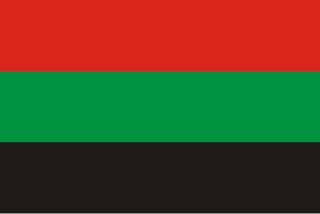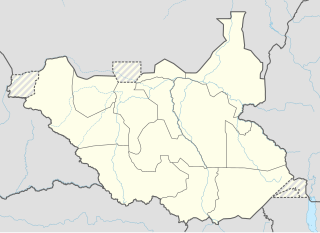Related Research Articles

Gambela or Gambella, also officially known as Gambela Peoples' Region, is a regional state in western Ethiopia, bordering South Sudan. Previously known as "Region 12", its capital is Gambela. The Region is situated between the Baro and Akobo Rivers, with its western part including the Baro River or Openo in the local language of the Anyuak or Anywaa people.

Gambela is a city and separate woreda in Ethiopia and the capital of the Gambela Region. Located in Anuak Zone, at the confluence of the Baro River and its tributary the Jajjabe, the city has a latitude and longitude of 8°15′N34°35′E and an elevation of 526 meters. It is surrounded by Gambela Zuria.

The Anyuak, also known as Anyua and Anywaa, are a Luo Nilotic ethnic group inhabiting parts of East Africa. The Anuak belong to the larger Luo family group. Their language is referred to as Dha-anywaa. They are primarily found in Gambela Region in western Ethiopia, South Sudan as well as Sudan. Group members number between 200,000 and 300,000 people worldwide. Many of the Anyuak people now follow Christianity. It is one of the first of the Nilotic groups to become almost entirely Christian, following the Shilluk people.

Riek Machar Teny Dhurgon is a South Sudanese politician who serves as the first Vice President of South Sudan.

The Baro River is a river in southwestern Ethiopia, which defines part of Ethiopia's border with South Sudan. From its source in the Ethiopian Highlands it flows west for 306 kilometres (190 mi) to join the Pibor River. The Baro-Pibor confluence marks the beginning of the Sobat River, a tributary of the White Nile.

The Gambela Peoples’ Democratic Movement was a political party in the Gambela Region of Ethiopia. It is the regional ally of the ruling EPRDF coalition.
Jor is one of the County in the Gambela Region of Ethiopia. Part of the Anuak Zone, Jor is bordered on the south by the Akobo River which separates it from South Sudan, on the west and north by the Nuer Zone, on the northeast by Abobo, and on the east by Gog; the Alooworro River defines part of its northern boundary. The administrative center of this County is Ongoogi.
Itang is an Ethiopian District, or woreda, in the Gambela Region of Ethiopia. Because Itang is not part of any Zone in the Gambela Region, it is considered a Special woreda, an administrative subdivision which is similar to an autonomous area. It is bordered on the south and southeast by the Anuak Zone, on the west by the Nuer Zone, on the northwest by South Sudan, and on the north by the Oromia Region; part of the southern boundary is defined by the Alwero River. The major town in Itang is Itang.
Gambela Zuria was a woreda in the Gambela Region of Ethiopia. Part of the Anuak Zone, Gambela Zuria is bordered on the south by Abobo, on the west by Itang special woreda, and on the north and east by the Oromia Region. Gambela, which is the capital of the Region, is surrounded by this woreda.

Akobo is one of the Districts of Ethiopia, or woredas, in the Gambela Region of Ethiopia. It is named after the Akobo River, which flows westwards then north into the Baro River, defining its border with South Sudan. Part of the Nuer Zone, Akobo is bordered on the south and west by South Sudan, on the north by Wentawo, and on the east by the Anuak Zone. The westernmost point of this woreda is the westernmost point of Ethiopia. Towns in Akobo include Tergol.
Jikawo is one of the Districts of Ethiopia, or woredas, in the Gambela Region of Ethiopia. Part of the Nuer Zone, Jikawo is bordered on the south by the Anuak Zone, on the west by the Alwero River which separates it from Wentawo, on the north by the Baro River which separates it from South Sudan, and on the east by Lare. Towns in Jikawo include Nginngang and Telut.

Itang is a town in the Gambela Region in western Ethiopia. Within Gambela, Itang belongs to Itang woreda which forms a special woreda. Located on the Baro River, this town has a latitude and longitude of 08°12′N34°16′E with an elevation of 480 meters above sea level.
Ethnic violence in South Sudan has a long history among South Sudan's varied ethnic groups. South Sudan has 64 tribes with the largest being the Dinkas, who constitute about 35% of the population and predominate in government. The second largest are the Nuers. Conflict is often aggravated among nomadic groups over the issue of cattle and grazing land and is part of the wider Sudanese nomadic conflicts.
Agwa Alemo was an Ethiopian politician. He belonged to the Anuak ethnic group, and became the first president of the Gambela region.

The Gambela People's Liberation Movement was a rebel group in the Gambela Region in Ethiopia. The GPLM was founded by Anuak dissidents during the Derg and Woyane regime. The organization remained dominated by Anuaks. Agwa Alemu was the chairman of the GPLM.
Anuak Zone or Anywaa Zone is one of the three zones of the Ethiopian Region of Gambela. It was created from former Administrative Zone 1 and Administrative Zone 2 of Gambela. This zone is bordered on the southwest by South Sudan, on the southeast by the Southern Nations, Nationalities, and Peoples Region, on the east by Majang Zone, on the northeast by the Oromia Region, and on the northwest by South Sudan and Nuer Zone. Towns in this zone include Gambela, Abobo and Pinyudo.
Nuer is one of the three zones of Ethiopia's Gambela Region. It was created from former Administrative Zone 3 of Gambela. This zone is bordered by South Sudan on the south, west and northand by Anuak Zone on the east; the Pibor defines the border on the south and west, while the Baro defines it for the northern border. Towns in this zone include Tirgol, Matar, Nyinenyang, Kuachthiang and Kuergeng. Nuer Zone consists of five woredas: Akobo, Jikawo, Lare, {Makuey (Woreda)and [Wentawo](Matar).

Wunlit is a village in Tonj State, South Sudan. The village is most widely known for a peace conference held there in 1999.

The Ethiopian Unity Patriots Front is a political party and militant rebel organization that waged an insurgency against the Ethiopian government from 1993 to 2012. Formed by ex-officials of the Derg regime, the EUPF was mostly active in Ethiopia's Gambela Region as well as eastern Sudan and South Sudan. The group agreed to a ceasefire with the Ethiopian government in 2012, and officially ended its insurgency in 2016. The EUPF remains active, however, and its armed wing has reportedly been involved in the South Sudanese Civil War, although to what extent is disputed.
References
- ↑ Dereje Feyissa (1 July 2011). Playing Different Games: The Paradox of Anywaa and Nuer Identification Strategies in the Gambella Region, Ethiopia. Berghahn Books. p. 152. ISBN 978-0-85745-089-0.
- 1 2 Günther Schlee; Elizabeth E. Watson (2009). Changing Identifications and Alliances in North-East Africa: Sudan, Uganda and the Ethiopia-Sudan borderlands. Berghahn Books. p. 199. ISBN 978-1-84545-604-7.
- ↑ Bahru Zewde (2008). Society, State, and Identity in African History. African Books Collective. p. 142. ISBN 978-99944-50-25-1.
- ↑ Eva-Maria Bruchhaus; Monika M. Sommer (4 July 2008). Hot spot horn of Africa revisited: approaches to make sense of conflict. Lit. p. 154. ISBN 978-3-8258-1314-7.